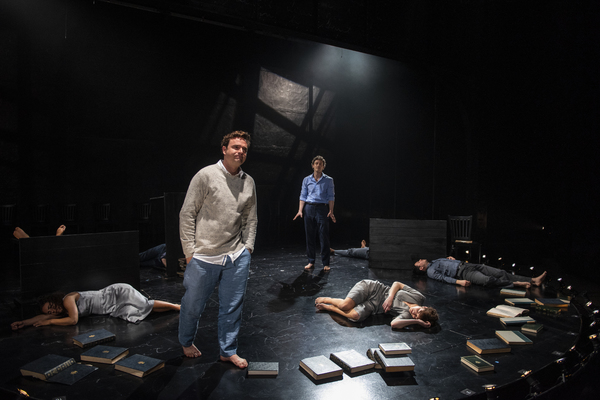
“Almost every wise saying has an opposite one, no less wise, to balance it; so that a man rich in such lore, like Sancho Panza, can always find a venerable maxim to fortify the view he happens to be taking.”
George Santayana, The Life of Reason
Terry Teachout on the arts in New York City

“Almost every wise saying has an opposite one, no less wise, to balance it; so that a man rich in such lore, like Sancho Panza, can always find a venerable maxim to fortify the view he happens to be taking.”
George Santayana, The Life of Reason

“’Tis said that courage is common, but the immense esteem in which it is held proves it to be rare. Animal resistance, the instinct of the male animal when cornered, is no doubt common; but the pure article, courage with eyes, courage with conduct, self-possession at the cannon’s mouth, cheerfulness in lonely adherence to the right, is the endowment of elevated characters.”
Ralph Waldo Emerson, “Courage”

The thirty-second episode of Three on the Aisle, the twice-monthly podcast in which Peter Marks, Elisabeth Vincentelli, and I talk about theater in America, is now available on line for listening or downloading.
Here’s an excerpt from American Theatre’s “official” summary of the proceedings:
In this episode, the critics speak with composer/lyricist David Yazbek, who is nominated for the best score Tony Award for Tootsie. The critics chat with him about his “odoriferous” songs, including his work on Women on the Verge of a Nervous Breakdown and The Band’s Visit. He also discusses songs he wishes he had written, including the theme from Shaft.
In addition, the critics talk about shows they’ve seen lately: Grief Is the Thing With Feathers by Max Porter at St. Ann’s Warehouse in Brooklyn, The Plough and the Stars by Sean O’Casey at the Irish Repertory Theatre Off-Broadway, and J.T. Rogers’s Oslo playing at Round House Theatre in Bethesda, Md.
We’d also planned to answer some questions from our mailbag, but all three of us had so much fun chatting with Yazbek that we decided on the spur of the moment to let the interview segment run extra-long. I think you’ll hear why—not only is he a terrific talker, but we found him to be extraordinarily forthcoming.
To listen to or download this episode, read more about it, or subscribe to Three on the Aisle, go here.
In case you’ve missed any previous episodes, you’ll find them all here.
* * *

Theater in Chicago has a bold immediacy that sets it apart from what you see elsewhere in America, and Barbara Gaines’ new Chicago Shakespeare “Hamlet” is the embodiment of all that is best and most distinctive about it. A cunningly abridged modern-dress-and-pop-music staging that eschews the tired clichés of that genre, this “Hamlet” flies across the stage with the gut-ripping speed of a slug from a .45, featuring a performance of the title role by Maurice Jones that is flat-out spectacular….
Costumes notwithstanding, this is not a high-concept “Hamlet” but a down-the-center revenger’s tale of grief run amok, a tragic thriller that begins by the grave of Hamlet’s murdered father and ends with a stageful of corpses. What happens in between unfolds on a thrust-stage set that suggests a black hole of despair, one around which Mr. Jones stalks like a starving panther. The technology, like the décor and music, is very much up to date—you’ll be astonished by the way in which Ms. Gaines and her designers conjure up the dead king’s ghost—but the emotions are timeless.
It’s a tribute to Mr. Jones’ acting that he makes so colossal an impression in a production whose cast includes a goodly share of Chicago’s top actors…

When I bristle at a show everyone else loved, I occasionally catch myself wondering whether my head was screwed on tightly enough. That’s why I decided to review a Chicago-area revival of “Next to Normal,” the 2008 Brian Yorkey-Tom Kitt pop-rock musical about bipolar disorder that won a Pulitzer Prize for drama and knocked out most of my colleagues. Unlike them, I found its portrayal of mental illness to be prettified and glib, and wondered whether “Next to Normal” might be more believable when mounted by David Cromer, America’s greatest stage director, for Writers Theater, America’s finest regional theater company. Sure enough, it is, to a degree not far from staggering….
As always, Mr. Cromer finds the tough center of truth in a script and puts it on stage as simply as possible, intensified by a poetic naturalism to which he alone holds the key. In his hands, “Next to Normal” becomes the story not of a crazy diva-mother who gets all the best tunes but of a nuclear family shattered by a sickness too strong for love. Everyone and everything, even the offstage pit band, is satisfyingly understated, including Keely Vasquez, who plays Diana, the manic mother who goes off her meds. Ms. Vasquez is so plausible that she comes across not as a singing actor but as a mom-next-door who stuns her neighbors by slashing her wrists….
* * *
Read the whole thing here.The trailer for Hamlet:
David Cromer talks about his revival of Next to Normal:

An excerpt from a performance of Merce Cunningham’s Septet, telecast in 1964. Cunningham is the male dancer. The score is Erik Satie’s Three Pieces in the Form of a Pear:
(This is the latest in a series of arts- and history-related videos that appear in this space each Monday, Wednesday, and Friday)

“you have to love dancing to stick to it. it gives you nothing back, no manuscripts to store away, no paintings to show on walls and maybe hang in museums, no poems to be printed and sold, nothing but that single fleeting moment when you feel alive. it is not for unsteady souls.”
Merce Cunningham, Changes: Notes on Choreography

“Human justice is very prolix, and yet at times quite mediocre; divine justice is more concise and needs no information from the prosecution, no legal papers, no interrogation of witnesses, but makes the guilty one his own informer and helps him with eternity’s memory.”
Søren Kierkegaard, Eighteen Upbuilding Discourses
* * *
“I am an American, Chicago born.” A quarter-century ago, those words were still familiar enough that you could have used them as a high-dollar “Double Jeopardy!” clue and expected any contestant with a halfway serious interest in the contemporary novel to know their author. Today, though, only specialists in postwar American fiction are likely to recognize the once-famous opening line of “The Adventures of Augie March,” the 1953 novel that put Saul Bellow on the map of American literature….

This makes it all the more surprising that the Court Theatre, the professional theater of the University of Chicago, has just given the premiere of David Auburn’s new stage adaptation of “Augie March,” which is every bit as ambitious as the 600-page book on which it’s based. Staged with staggering éclat by Charles Newell, the Court’s artistic director, it is totally and triumphantly successful, a three-and-a-half-hour seriocomic extravaganza so light on its feet that it scarcely feels two hours long….
But why the initial surprise? Because “Augie March” is a stage version of a major novel, a bastard genre notoriously difficult to bring off. As John Simon put it in an apothegm known to drama critics as Simon’s Law, “There is a simple law governing the dramatization of novels: if it is worth doing, it can’t be done; if it can be done, it’s not worth doing.” Mr. Simon was stretching it a bit, as Kate Hamill has proved in recent seasons with her witty adaptations of “Pride and Prejudice,” “Sense and Sensibility” and “Vanity Fair.” Even so, he was onto something, for great novels don’t need to be dramatized—they are by definition sufficient unto themselves. And that’s the loophole through which Mr. Auburn has slipped with Bellow’s picaresque tale of a poor young Jewish immigrant who girdles the world in search of his “purest feelings”: “Augie March” is not really a great novel, much as it strains to be. Sprawlingly long and over-lush in diction, it lacks the artistic self-discipline necessary to hit the pinpoint bull’s-eye of true greatness. In fact, I’d go so far as to say that Mr. Auburn has improved on the novel, imposing on it a welcome tautness and pruning its self-consciously exuberant verbal excesses….
Thirteen actors play 40 different parts in Mr. Auburn’s script. The only one who sticks to a single role is Patrick Mulvey, who is appropriately winning as Augie, an earnest naïf too easily swayed from the path of self-knowledge by the men and women who pass through his eventful life. Everyone else doubles, triples and quadruples, and Mr. Newell has assembled an ensemble cast full of resourceful performers, each of whom makes a deep and distinctive impression…
* * *
Read the whole thing here.A montage of scenes from The Adventures of Augie March:
David Auburn talks about the play:
An ArtsJournal Blog